Keywords are the essence of your SEO. They are important because every successful campaign starts with understanding what your audience is looking for, and what words bring them to your website. Therefore, optimizing your content using SEO keywords is vital for making your website rank high on Google. Curious to know more? In this article, you’ll learn what exactly SEO keywords are, how they work, and where to find them.
In SEO, keywords are broadly defined as the topics or ideas that describe the content and context of your website. In general, keywords contribute to your search engine rankings because search engines use them to understand the content and display the right page for a user’s search query.
When people use search engines, they use specific search terms to find the content they are looking for. You expect to see relevant content that answers your needs when typing down a question or a sentence. This is where keywords come in. Every search term that users enter in Google can be considered a keyword you can optimize for.
Keywords are used in SEO to connect people (your audience) with your website. They are essential because they signify there is some demand behind the content you produce. If your content is optimized around a keyword that has a large enough search demand, it means enough people search for this term on a regular basis. In turn, this can prove to be a good business case, because it justifies you spending time on optimizing your pages.
What are keywords in SEO?
Think of them as the key ingredients to create SEO-friendly content. Keywords are a major influencing factor when it comes to ranking in Google. That’s because when people search for something, the search engine uses those keywords to organize the content and display it from high to low relevance. In general, the more relevant the content, the higher it ranks (although, naturally, other factors also come into play).
The interesting thing about keywords is that they represent how people search for information online. Many of those searches happen with complex queries when people look for a specific type of information (e.g., “how to write good content”). Meanwhile, other keywords are broader and don’t fully reveal what users need when searching (e.g., “content marketing”).
Both of these types come with pros and cons. Naturally, the more specific a keyword is, the more it reveals what the user wants to find. That is, it implies a direct action the user wants to take or a benefit they wish to receive. However, in general, fewer people search for those keywords – because they are specific.
In contrast, more broad keywords are generally searched for by more people. However, they are harder to rank for in Google Search because they are so broad and invite tons of competition. Additionally, as a company, you’re not incentivized to rank for them because it’s unlikely that they bring you customers.
For example, in The United States alone, the search volume for “content marketing” has approximately 14.800 searches per month. This is how often, on average, people search online for the words “content marketing”. But this term is quite broad, and it provides general information. If somebody is looking for a more specific topic related to content marketing, the given results won’t answer their needs. Besides, the high search volume means that your content is less likely to rank high on the search results page because of its high level of competition.
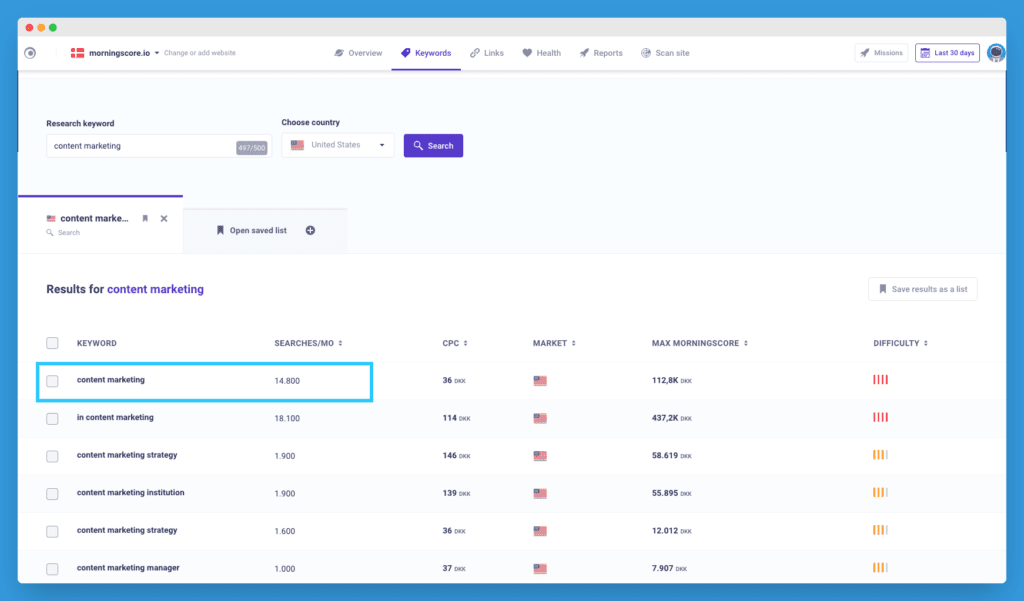
Meanwhile, the more specific keyword, “how to write good content”, has fewer than 5.000 searches per month. Still, people who are typing down this term are looking for specific information about this topic. Therefore, they are more likely to click on a page that provides them with that precise answer. In addition, the competition for this keyword is lower, increasing the likelihood of your content ranking higher on the search results page.
Research by popular SEO platforms has found that 29.13% of keywords consist of three or more words – meaning more specific search queries. As a content creator, these are the type of keywords you want to use to make your content SEO-friendly. That’s because using specific keywords that correspond to your audience’s search intent makes your content more relevant and meaningful to those people. It answers precisely their needs and questions. Therefore, the chances of people clicking on your content increase, implying a higher conversion rate. In the end, using specific keywords contributes to your page ranking, making it visible to both search engines and your audience.
How do keywords work in SEO?
Keywords are the essence of search engine optimization because they are the words people use when searching for something online. SEO is impossible without keywords. Using keywords as part of your SEO routine ensures that your pages will rank for those terms your target audience is searching for. This increases the visibility of your content.
Google loves answering people’s questions. It uses something called “search intent”, which is the goal behind a user’s search. Google defines this broadly as the “need the user wants to be solved”. Now, when you hear “need”, your first assumption might be that users are looking for solutions to specific problems. However, a “need” doesn’t necessarily refer to a product or a service. Often, people also look for entertainment, education, and product reviews, among millions of other things. In all of these cases, your content has to match those “needs” – that is, the user’s expectations.
Google’s goal is to always help end-users – otherwise, users won’t return and use the search engine again. Because of that, Google tries to surface only the most relevant and trustworthy content possible for each search term.
What is keyword search intent in SEO?
Search intent is the reason behind an online search. Every person searching is either looking to answer a question, find a particular product/website, or compare and buy something.
Because users expect different things with their searches, SEOs have tried classifying the types of search intent:
- Informational search
- Navigational search
- Commercial search
- Transactional search
Say you want to know which are the types of keywords used in SEO. You type it down, and Google finds the answer for you. This is called an informational search.
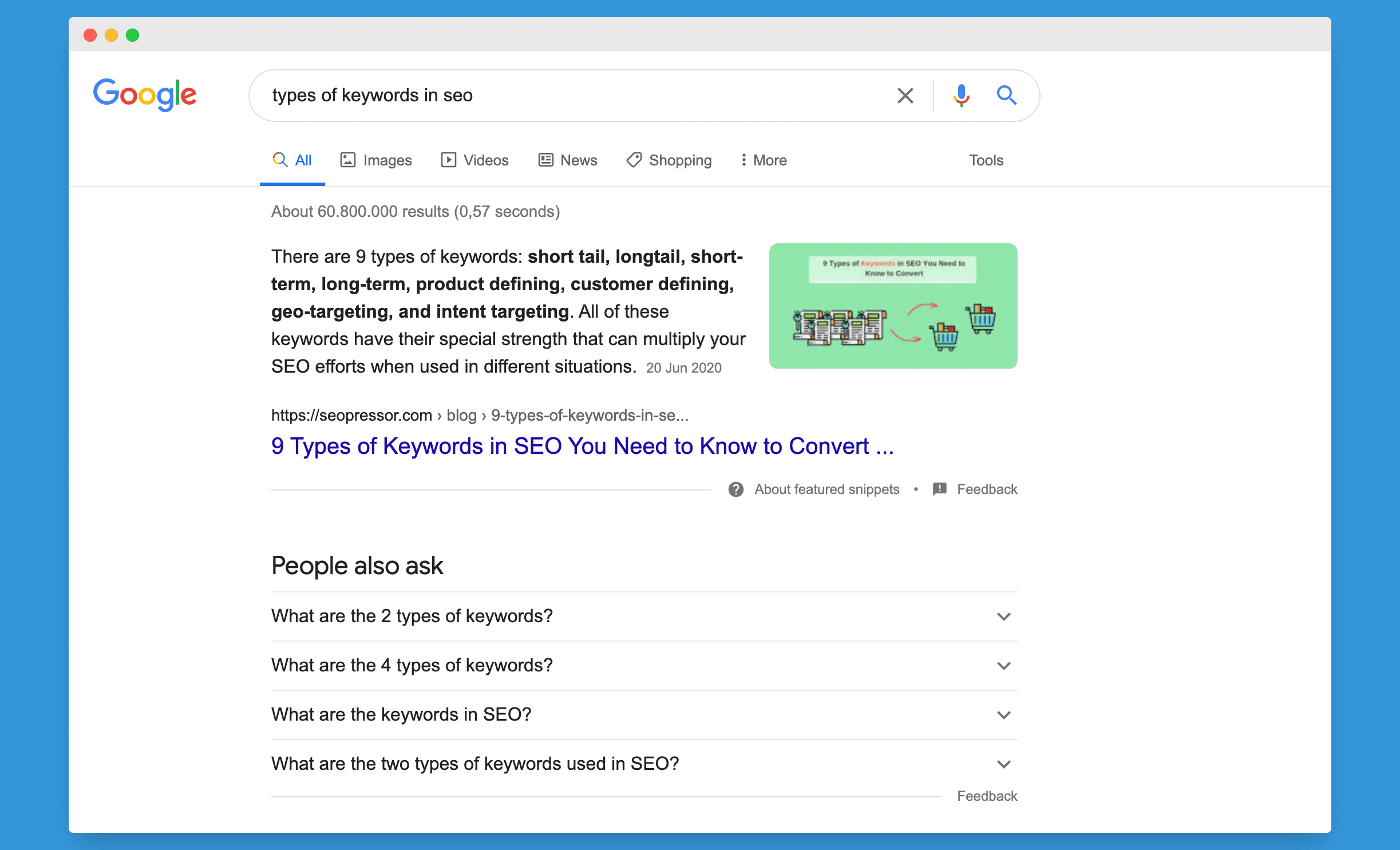
Another type of search intent is the navigational one when the user is looking for a specific website. For example, people may type down “LinkedIn login” to sign in on LinkedIn.
Commercial search intent is used by people who consider buying a product/service and want to read reviews and comparisons to make an informed decision. For example, searchers may use phrases such as “WordPress or Squarespace” or “WordPress or Shopify” to assess the right platform for their website.
Once a decision has been made, the user moves on to make a transactional search to actually purchase the product. This could look something like “buy domain Squarespace”.
Again, depending on the searcher’s intent (goal), Google displays the correct piece of information.
Tip: find out your audience’s search intent and add those keywords to your content.
This is the key to high-rankable pages.
Examples of keywords in SEO
People are looking for all kinds of things on Google, using shorter or longer words. These are also called “search queries”. In SEO, we use people’s search queries to build the content around them. They are the words and phrases that describe what your content is about. Let’s look at some practical examples of keywords in SEO.
For example, suppose you’re looking to learn about content marketing. In that case, you might type down phrases like “what is content marketing” or “content marketing examples”. See below one of the search results and how the keyword “content marketing” is used throughout the page.

As your content marketing knowledge grows, your intent gets more specific. You might search for “how to create a content strategy”. This search query displays many results with step-by-step guides regarding content strategy. One of these pages is from HubSpot, and you can see how the keyword “content strategy” is used:
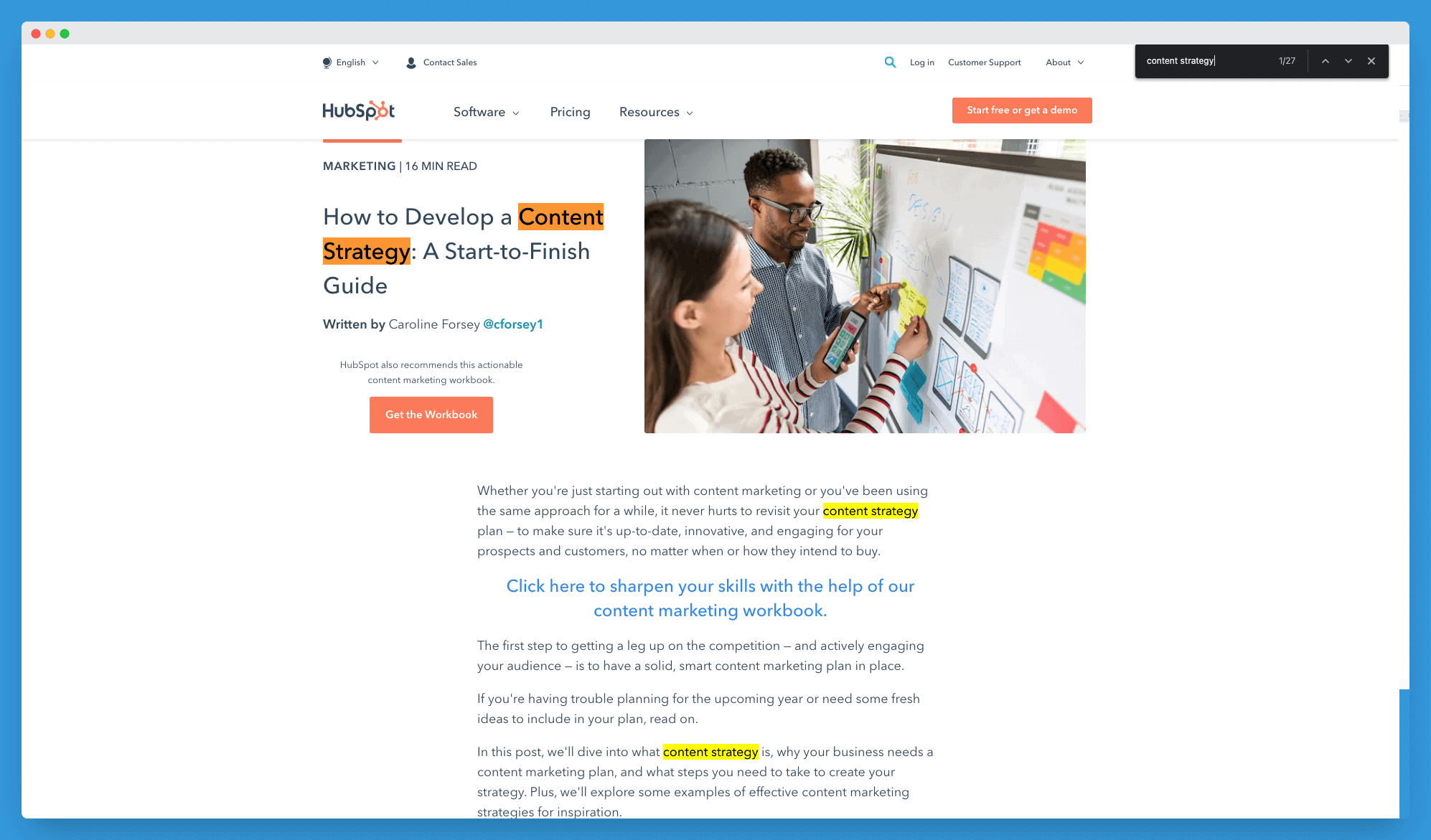
Why are keywords important in SEO?
Keywords are important in SEO because they help your page rank higher, and people find your website faster. Using keywords also contributes to creating content that is relevant to your audience. Your page is more likely to be seen and clicked on when searchers want information about a certain topic or product that you wrote about, using the right keywords.
Keywords are important to content creators, SEO professionals, and Google. If you want to meet people’s needs when searching, keywords are the answer: they express what users are looking for.
Keywords are used in SEO to connect people with your website. Adding keywords to your page increases the chance of your website ranking high on the search engines, and becoming visible to your target audience.
For example, when you search for “SEO glossary” Morningscore appears at the top of the results:
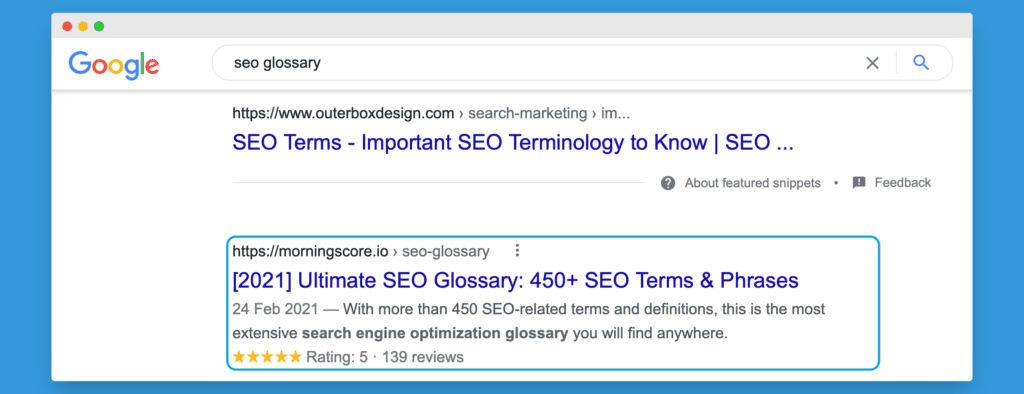
Where can I find my SEO keywords?
The most popular ways to find your SEO keywords are to use a free tool such as Google Search Console or to use a third-party SEO tool. Discovering the keywords that people use to find your content is vital for optimizing your pages and generating SEO-friendly websites.
The cheapest and easiest way to find your SEO keywords is to use the Google Search Console, a tool that shows you what keywords your website ranks for. To view the search queries that brought people to your website, use Google Search Console and navigate to Search Results in the Performance window. Here, click on the Query tab, and you can see your SEO keywords.
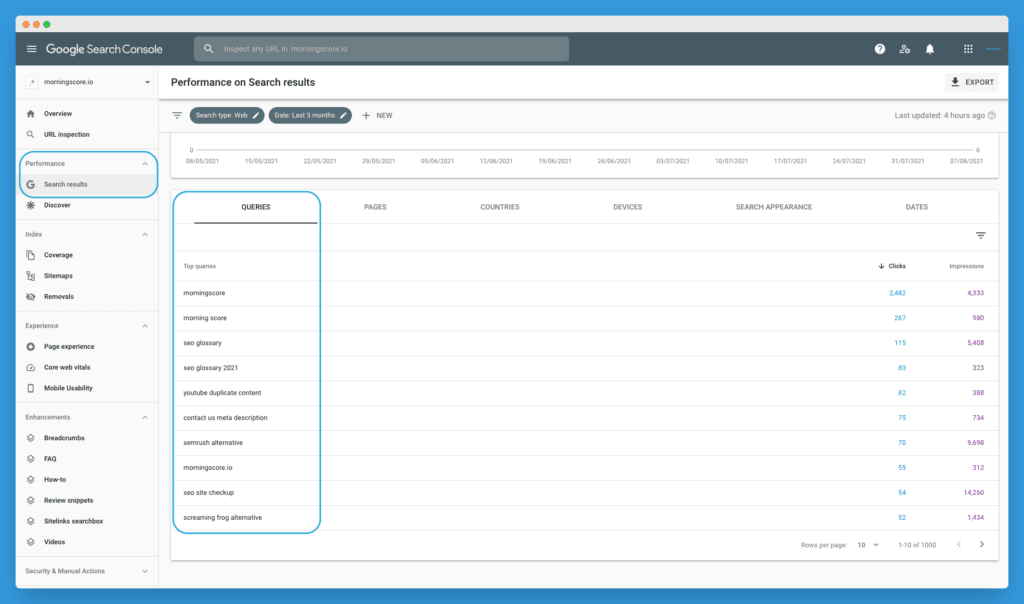
Besides the Google Search Console, there are plenty of third-party tools you can use. For example, you can use our keyword management tool to discover the keywords your website is ranking for, or even check your competitors’ keywords.
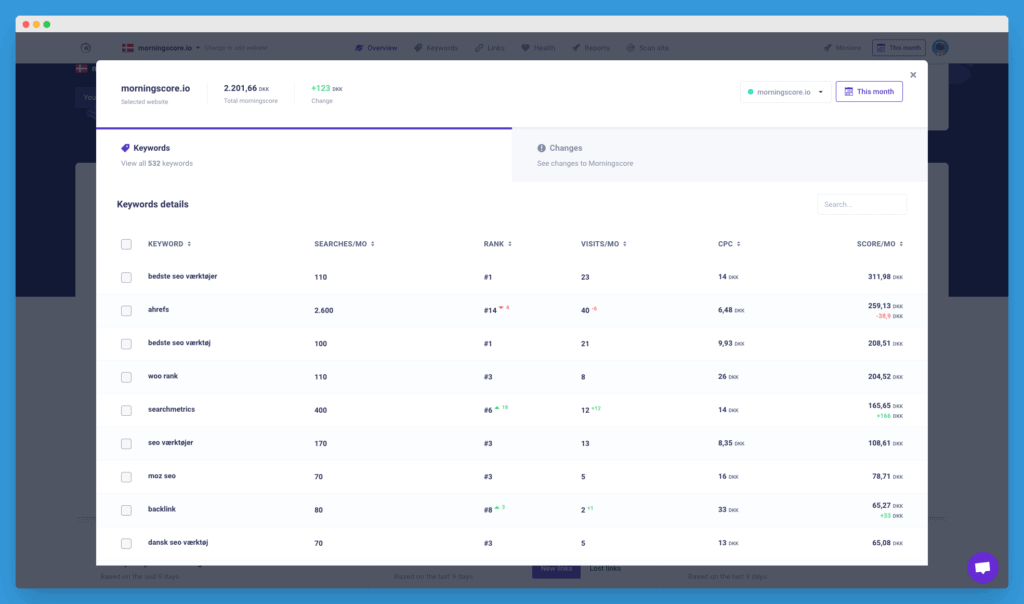
Optimize your website using SEO keywords
In conclusion, SEO keywords and the searcher’s intent are used to create content that brings value to your audience and gets ranked by search engines. Keywords help you connect people with your website. Making a list with the most relevant keywords is an essential first step in your SEO process.
In addition, using the right keywords helps you optimize your current pages, boosting your website’s ranking. Find the right keywords to rank for by using our keyword research tool.

